The Power of Personal Stories
Several stories in our multimedia eBook series, A Story of Health, are certified for up to 6.25 units of free, asynchronous and online continuing medical and nursing education credits (Wildfires, Children’s Cancer, and Asthma. See details below). The series grounds the science of health in stories of fictional people, their families, and communities to enable readers to explore the risk factors for disease as well as how to prevent disease and promote health. Using the setting of a family reunion as a backdrop, we explore how multiple environments influence our health across the lifespan. We use a case-based learning approach, often used in medical education to maximize learning outcomes
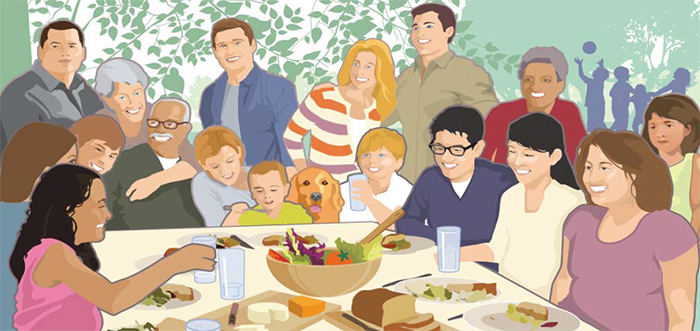
Free Continuing Education for Health Professionals
Through CDC Train, several modules in this eBook series are certified for FREE continuing education. Each story is accredited separately with information available below. Click the drop-down rectangle that says “CE Credit Details” with a plus sign (+) to access details on enrollment.
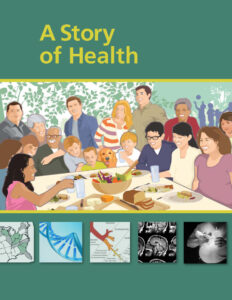
Why you should read the eBook
When people get sick or develop a disability, they often ask their health care providers, “How or why did this happen?” A Story of Health explores this question and delves into how our environments interact with our genes to influence health across the lifespan. A Story of Health is told through the lives of three fictional characters and their families – Sofia, whose family is exposed to the dangers of a wildfire; Stephen, a toddler who was recently diagnosed with leukemia; and Brett, a young boy with asthma. Colorful illustrations, graphics and videos enhance each page. Links to a wide range of additional resources and hundreds of scientific papers enrich each story with information to promote health and prevent disease. A Story of Health is useful to readers ranging from health professionals to health advocates, from policymakers to those in the health and science media.
Note: To navigate the eBook as intended, download, save, and view the book using Adobe Acrobat Reader.
Download A Story of Health eBook by Chapter (FREE):
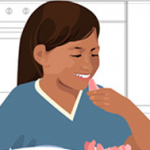 Sofia’s Story (Health Effects of Wildfires)
Sofia’s Story (Health Effects of Wildfires)
Download PDF: Sofia’s Story (23 pages, 7.25 MB)
Follow Sofia and her family as they learn how to protect themselves from the immediate and longer term health dangers of a wildfire, with a focus on children’s health and prevention strategies.
Sofia's Story: CE Credit Details
ACTIVITY TITLE: A Story of Health: Sofia’s Story (Wildfire Health Impacts)
ACTIVITY NUMBER: SS4465R
PROGRAM DESCRIPTION: This training is designed to introduce the educational case study, ASOH Wildfires Smoke, Sofia’s Story (Wildfire Health Impacts). This presentation is part of a series of self-instructional modules designed to increase the primary care provider’s knowledge of hazardous substances in the environment; and to help in evaluating and treating potentially exposed patients.
OBJECTIVES:
At the conclusion of the session, the participant should be able to:
- Identify the components of smoke resulting from wildfires.
- Explain the relationship between climate change and wildfires.
- Explain how wildfire smoke affects asthma.
- List ways patients can protect themselves from wildfire smoke.
- Describe wildfire emergency preparedness procedures to protect health.
- Explain how to assess and protect indoor air quality during wildfires.
- Explain why children are more vulnerable to wildlife smoke than adults.
- Describe how to improve collaborative practice across the healthcare team regarding the diagnosis and treatment of patients expose to smoke from wildfires.
Faculty/Credentials
Stephanie Holm MD, MPH
Co-Director
Western States Pediatric Environmental Health Specialty Unit, University of California, San Francisco
Samuel Goldman MD, MPH,
Professor of Medicine & Neurology
Western States Pediatric Environmental Health Specialty Unit,
University of California, San Francisco
Mark Miller, M.D., MPH
Associate Clinical Professor, UCSF
Director, Western States Pediatric Environmental Health Specialty Unit
Director, Children’s Environmental Health Center, California EPA
Anthony Pacini MD, MPH
USN – Medical Corps
Resident Physician
UCSF Occupational and Environmental Medicine
Western States Pediatric Environmental Health Specialty Unit
University of California, San Francisco
Marie Valenti
Director, Health Education Literacy Program
Commonweal
Marya Zlatnik MD, MMS
Professor, Ob, Gyn, Repro Sci
Division of Maternal Fetal Medicine
Western States Pediatric Environmental Health Specialty Unit
University of California, San Francisco
ORIGINATION DATE: September 01, 2021
RENEWAL DATE: September 01, 2023
EXPIRATION DATE: March 2, 2026
URL: https://www.train.org/cdctrain/course/1118589/details
HARDWARE/SOFTWARE: Computer Hardware; Internet Connection; Browser
MATERIALS: None
TARGET AUDIENCE: Physicians, Registered Nurses, and Health Professionals
PREREQUISITES: None
FORMAT: This activity is a Self-Study
CONTACT INFORMATION: Office of Office of Capacity Development and Applied Prevention Science (OCDAPS), Environmental Medicine and Health Systems Intervention Section, Agency for Toxic Substances and Disease Registry (ATSDR), Centers for Disease Control and Prevention (CDC) 770-488-0715
ACCREDITATION STATEMENTS:
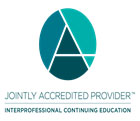 In support of improving patient care, The Centers for Disease Control and Prevention is jointly accredited by the Accreditation Council for Continuing Medical Education (ACCME), the Accreditation Council for Pharmacy Education (ACPE), and the American Nurses Credentialing Center (ANCC), to provide continuing education for the healthcare team.
In support of improving patient care, The Centers for Disease Control and Prevention is jointly accredited by the Accreditation Council for Continuing Medical Education (ACCME), the Accreditation Council for Pharmacy Education (ACPE), and the American Nurses Credentialing Center (ANCC), to provide continuing education for the healthcare team.
CME: The Centers for Disease Control and Prevention designates this enduring activity for a maximum of (1.0) AMA PRA Category 1 Credits™. Physicians should claim only the credit commensurate with the extent of their participation in the activity.
CNE: The Centers for Disease Control and Prevention designates this activity for (1.0) nursing contact hours.
CEU: The Centers for Disease Control and Prevention is authorized by IACET to offer (.1) CEU’s for this program.
CECH: Sponsored by the Centers for Disease Control and Prevention, a designated provider of continuing education contact hours (CECH) in health education by the National Commission for Health Education Credentialing, Inc. This program is designated for Certified Health Education Specialists (CHES®) and/or Master Certified Health Education Specialists (MCHES®) to receive up to (1.0) total Category I continuing education contact hours. Maximum advanced level continuing education contact hours available are 1.0 Continuing Competency credits available are 1.0 CDC provider number 98614.
For Certified Public Health Professionals (CPH)
The Centers for Disease Control and Prevention is a preapproved provider of Certified in Public Health (CPH) recertification credits and is authorized to offer (1.0) CPH recertification credits for this program.
DISCLOSURE: In compliance with continuing education requirements, all planners and presenters must disclose all financial relationships, in any amount, with ineligible companies during the previous 24 months as well as any use of unlabeled product(s) or products under investigational use.
CDC, our planners, and content experts wish to disclose they have no financial relationship(s) with ineligible companies whose primary business is producing, marketing, selling, reselling, or distributing healthcare products used by or on patients.
Content will not include any discussion of the unlabeled use of a product or a product under investigational use.
CDC did not accept financial or in-kind support from ineligible companies for this continuing education activity.
Instructions for Obtaining Continuing Education (CE)
To receive continuing education (CE) for SS4465R A Story of Health: Sofia’s Story (Wildfire Health Impacts), please visit CDC TRAIN and search for the course in the Course Catalog using SS4465R. Follow the steps below by 3/2/2026.
- Register for and complete the course.
- Pass the post-assessment at 75%.
- Complete the evaluation.
- Visit Your Learning to access your certificates and transcript.
FEES: No fees are charged for CDC’s CE activities.
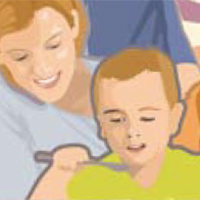 Stephen’s Story (Childhood Cancer)
Stephen’s Story (Childhood Cancer)
Download PDF: Stephen’s Story (47 pages, 15 MB)
Explore the many risk factors for leukemia, and the emotional toll this disease takes on families through the story of three-year-old Stephen and his parents.
Stephen’s Story: CE Credit Details
Course: SS4677
CE Original Date: August 1, 2023
CE Expiration Date: December 10 , 2025
Program Description
A Story of Health: Childhood Cancer is one module in A Story of Health which conveys complex concepts about multiple influences on health through a family reunion scenario, allowing stories to emerge about family members with a range of diseases, which we will explore from a case study perspective. This storyline allows for geographic distribution including family members from various rural, suburban, and city locales. Each story reveals the constellation of genetics and environmental circumstances that might affect the particular disease (in this case childhood cancer), and brings in the latest available science. An introduction describes the ecological approach to health and its many variables. The stories are enhanced by a variety of media including sidebars, pop-up boxes, illustrations, graphics, videos and links to additional resources and key journal references.
Objectives
At the conclusion of the session, the participant should be able to:
- Describe the characteristics of childhood cancer.
- Discuss trends associated with childhood cancer.
- Discuss environmental risk factors for childhood cancer.
- Discuss factors that reduce the risk of childhood leukemia.
- Describe how to improve collaborative practice across the healthcare team regarding preventing risk factors for childhood cancer.
Faculty/Credentials
Dahl, Gary MD, Emeritus Professor (Retired) Stanford University School of Medicine
Lanphear, Bruce MD MPH, Professor and Prevention Wizard, Simon Fraser University and Little Things Matter
Metayer, Catherine MD PhD, Adjunct Professor, University of California Berkeley
Miller, Mark MD MPH, Director, Children’s Environmental Health Center at the California Environmental Protection Agency
Whitehead, Todd PhD, Assistant Researcher University of California Berkeley School of Public Health
Wiemels, Joseph PhD, Professor Department of Population and Public Health Sciences, University of Southern California
Accreditation Statements
 In support of improving patient care, this activity has been planned and implemented by Centers for Disease Control and Prevention and Western States Pediatric Environmental Health Specialty Unit and Commonweal. The Centers for Disease Control and Prevention is jointly accredited by the Accreditation Council for Continuing Medical Education (ACCME), the Accreditation Council for Pharmacy Education (ACPE), and the American Nurses Credentialing Center (ANCC), to provide continuing education for the healthcare team.
In support of improving patient care, this activity has been planned and implemented by Centers for Disease Control and Prevention and Western States Pediatric Environmental Health Specialty Unit and Commonweal. The Centers for Disease Control and Prevention is jointly accredited by the Accreditation Council for Continuing Medical Education (ACCME), the Accreditation Council for Pharmacy Education (ACPE), and the American Nurses Credentialing Center (ANCC), to provide continuing education for the healthcare team.
CME: The Centers for Disease Control and Prevention designates this enduring activity for a maximum of 3.75 AMA PRA Category 1 Credits™. Physicians should claim only the credit commensurate with the extent of their participation in the activity.
CNE: The Centers for Disease Control and Prevention designates this activity for 3.75 nursing contact hours.
CEU: The Centers for Disease Control and Prevention is authorized by IACET to offer 0.4 CEU’s for this program.
CECH: Sponsored by the Centers for Disease Control and Prevention, a designated provider of continuing education contact hours (CECH) in health education by the National Commission for Health Education Credentialing, Inc. This program is designated for Certified Health Education Specialists (CHES®) and/or Master Certified Health Education Specialists (MCHES®) to receive up to 3.5 total Category I continuing education contact hours. Maximum advanced level continuing education contact hours available are 3.5. Continuing Competency credits available are 3.5. CDC provider number 98614.
For Certified Public Health Professionals (CPH)
The Centers for Disease Control and Prevention is a preapproved provider of Certified in Public Health (CPH) recertification credits and is authorized to offer 4.0 CPH recertification credits for this program.
Disclosure
In compliance with continuing education requirements, all planners and presenters must disclose all financial relationships, in any amount, with ineligible companies during the previous 24 months as well as any use of unlabeled product(s) or products under investigational use.
CDC, our planners, and content experts wish to disclose they have no financial relationship(s) with ineligible companies whose primary business is producing, marketing, selling, reselling, or distributing healthcare products used by or on patients.
Content will not include any discussion of the unlabeled use of a product or a product under investigational use
Instructions for Obtaining Continuing Education (CE)
To receive continuing education (CE) for SS4677-A Story of Health – Childhood Cancers: Stephen’s Story, please visit CDC TRAIN and search for the course in the Course Catalog using SS4677. Follow the steps below by December 10 , 2025.
- Register for and complete the course.
- Pass the post-assessment at 75%.
- Complete the evaluation.
- Visit Your Learning to access your certificates and transcript.
FEES: No fees are charged for CDC’s CE activities.
Contact Us: ceatsdr@cdc.gov
¡Nuevo! Stephen's Story En Español
¡Nuevo! Edición en español sobre el cáncer infantil
Hemos traducido “Una historia de salud sobre el cáncer infantil: La historia de Esteban ” al español para que su valiosa información esté disponible para todos los hispanohablantes. Con importantes contribuciones de los doctores Ana María Mora de Costa Rica y Juan Manuel Mejía-Arangure de México, hemos agregado nuevos datos específicos de países latinoamericanos sobre una variedad de temas, desde las tasas de cáncer en varios países hasta factores ambientales asociados con el cáncer. Ahora, encontrará enlaces a numerosos sitios web en español sobre el cáncer, así como nuevas referencias a artículos científicos en español.
Este capítulo gratuito de eBook incluye una gran cantidad de información sobre factores ambientales asociados con el cáncer infantil, tales como la contaminación del aire, los plaguicidas, los compuestos orgánicos volátiles, el tabaco y la exposición a radiación. También describe los beneficios de la lactancia materna, una dieta saludable, la suplementación de vitaminas prenatales y actividades tempranas de la infancia, como asistir a guarderías y la exposición a animales, para reducir el riesgo de leucemia y otros tipos de cáncer.
Invitamos a todos los profesionales de la salud hispanohablantes, defensores de la salud, legisladores y ciudadanos a descargar y usar este recurso gratuito. (Tenga en cuenta que no se ofrecen créditos de Educación Continua para esta edición.)
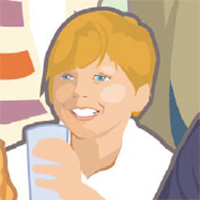 Brett’s Story (Asthma)
Brett’s Story (Asthma)
Download PDF: Brett’s Story (38 pages, 8 MB)
Explore the life of Brett, a nine-year-old who lives in Southern California and is coping with asthma.
Brett’s Story: CE Credit Details
Course: SS4678
Origination Date: May 12, 2023
Expiration Date: November 17, 2025
Program Description
A Story of Health: Asthma is one module in The Story of Health which conveys complex concepts about multiple influences on health through a family reunion scenario, allowing stories to emerge about family members with a range of diseases, which we will explore from a case study perspective. This storyline allows for geographic distribution including family members from various rural, suburban, and city locales. Each story reveals the constellation of genetics and environmental circumstances that might affect the particular disease (in this case asthma), and brings in the latest available science. An introduction describes the ecological approach to health and its many variables. The stories are enhanced by a variety of media including sidebars, pop-up boxes, illustrations, graphics, videos and links to additional resources and key journal references.
Objectives
At the conclusion of the session, the participant should be able to:
- Discuss clinical symptoms associated with asthma.
- Describe the latest science on environmental, gene-environment risk factors for asthma.
- Describe how to counsel patients to avoid risk factors that may contribute to asthma.
- Describe how to improve collaborative practice across the healthcare team regarding the prevention of asthma.
Faculty/Credentials
John R. Balmes, MD, Professor of Medicine Emeritus, University of California San Francisco Division of Occupational and Environmental Medicine
Stephanie M. Holm, MD PhD MPH, Director, Western States Pediatric Environmental Health Specialty Unit
Mark Miller, MD MPH, Associate Clinical Professor, University of California San Francisco, Director Children’s Environmental Health Center, California Environmental Protection Agency
Rosalind J Wright, MD MPH, Horace W. Goldsmith Professor of Pediatrics, Icahn School of Medicine at Mount Sinai
Continuing Education
ACCREDITATION STATEMENTS:
 In support of improving patient care, this activity has been planned and implemented by Centers for Disease Control and Prevention, Western States Pediatric Environmental Health Specialty Unit, and Commonweal. The Centers for Disease Control and Prevention is jointly accredited by the Accreditation Council for Continuing Medical Education (ACCME), the Accreditation Council for Pharmacy Education (ACPE), and the American Nurses Credentialing Center (ANCC), to provide continuing education for the healthcare team.
In support of improving patient care, this activity has been planned and implemented by Centers for Disease Control and Prevention, Western States Pediatric Environmental Health Specialty Unit, and Commonweal. The Centers for Disease Control and Prevention is jointly accredited by the Accreditation Council for Continuing Medical Education (ACCME), the Accreditation Council for Pharmacy Education (ACPE), and the American Nurses Credentialing Center (ANCC), to provide continuing education for the healthcare team.
CME: The Centers for Disease Control and Prevention designates this enduring activity for a maximum of 1.5 AMA PRA Category 1 Credits™. Physicians should claim only the credit commensurate with the extent of their participation in the activity.
CNE: The Centers for Disease Control and Prevention designates this activity for 1.5 nursing contact hours.
CEU: The Centers for Disease Control and Prevention is authorized by IACET to offer 0.1 CEU’s for this program.
CECH: Sponsored by the Centers for Disease Control and Prevention, a designated provider of continuing education contact hours (CECH) in health education by the National Commission for Health Education Credentialing, Inc. This program is designated for Certified Health Education Specialists (CHES®) and/or Master Certified Health Education Specialists (MCHES®) to receive up to 1.5 total Category I continuing education contact hours. Maximum advanced level continuing education contact hours available are 1.5. Continuing Competency credits available are 1.5. CDC provider number 98614.
For Certified Public Health Professionals (CPH)
The Centers for Disease Control and Prevention is a preapproved provider of Certified in Public Health (CPH) recertification credits and is authorized to offer 2.0 CPH recertification credits for this program.
Disclosure
In compliance with continuing education requirements, all planners and presenters must disclose all financial relationships, in any amount, with ineligible companies during the previous 24 months as well as any use of unlabeled product(s) or products under investigational use.
CDC, our planners, and content experts wish to disclose they have no financial relationship(s) with ineligible companies whose primary business is producing, marketing, selling, reselling, or distributing healthcare products used by or on patients.
Content will not include any discussion of the unlabeled use of a product or a product under investigational use.
CDC did not accept financial or in-kind support from ineligible companies for this continuing education activity.
Instructions for Obtaining Continuing Education (CE)
To receive continuing education (CE) for SS4678 – A Story of Health: Asthma, Brett’s Story please visit CDC TRAIN and search for the course in the Course Catalog using SS4678 Follow the steps below by November 17, 2025.
- Register for and complete the course.
- Pass the post-assessment at 75%.
- Complete the evaluation.
- Visit Your Learning to access your certificates and transcript.
FEES: No fees are charged for CDC’s CE activities.
Contact Us: ceatsdr@cdc.gov

